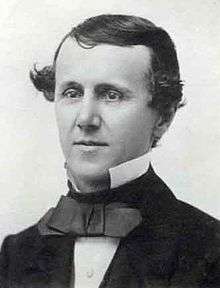Winthrop Sargent Gilman
Winthrop Sargent Gilman (28 March 1808 – 1 October 1884) was head of the banking house of Gilman, Son & Co. in New York City.
Winthrop Sargent Gilman | |
|---|---|
 Gilman, ca. 1860 | |
| Born | March 28, 1808 |
| Died | October 1, 1884 (aged 76) |
| Resting place | Greenwood Cemetery, Brooklynn |
| Known for | banker, abolitionist |
| Spouse(s) | Abia Swift Lippincott |
Biography
He was born in Marietta, Ohio to merchant Benjamin Ives Gilman and Hannah (Robbins) Gilman.[1] Benjamin Ives Gilman, born in 1766, was a native of Exeter, New Hampshire, where his ancestors were among the most prominent early settlers and where he graduated in the first class of the Phillips Exeter Academy.[2]
In 1837 Winthrop Sargent Gilman let the abolitionist Elijah Parish Lovejoy hide his printing press in one of Gilman's warehouses in Alton, Illinois.[3] In the ensuing riot the angry mob burned Gilman's warehouse to the ground and killed Lovejoy.[4] Following the Alton riots, Gilman moved to New York City and entered the family banking business. He was married to Abia Swift Lippincott Gilman, who in 1900 narrowly escaped burning to death from a gasoline torch in front of the Charles Scribner mansion at 12 East Thirty-eighth Street.[5]
Winthrop Gilman had an abiding interest in science and built a private observatory at his home 'Fern Lodge' at the Palisades, New York, where he frequently observed meteors.[6]
Gilman, Son & Co. in New York often acted in conjunction with the interests of the Brown family of Providence, Rhode Island, founders of Brown University. Subsequently, John Nicholas Brown and the Gilman Land Company, an offshoot of the Gilman family banking business, were involved in the development of the Gilman Block in Sioux City, Iowa, as well as other real estate properties.
Winthrop Sargent Gilman's sons were Winthrop S. Gilman, Jr. (1839–1923), Benjamin Ives Gilman, Theodore Gilman (1841–1930) and Arthur Gilman. Arthur was a banker with the family firm, but when his health faltered, he retired to his estate 'Glynllyn' in the Berkshires near Lee, Massachusetts, and became a writer on historical subjects and family history,[7] a philanthropist and the founder of Radcliffe College in Cambridge, Massachusetts.[8]
Papers
Papers of Winthrop Sargent Gilman and his sons and other Gilman family members are available for research use at the Minnesota Historical Society. They include correspondence, diaries, newspaper clippings, scrapbooks, printed materials, and genealogical information.[9]
References
- Ohio's Founding Fathers, Fred J. Milligan, IUniverse, 2003
- General Catalogue of Officers and Students, 1783-1903, Phillips Exeter Academy, News-Letter Press, Exeter, 1903
- Searches into the History of the Gillman or Gilman Family, Alexander William Gillman, Elliot Stock, London, 1895
- "Winthrop S. Gilman Dead: An Original Abolitionist and Successful Business Man and Banker". The New York Times. 1884-10-05.
Winthrop Sargent Gilman, head of the banking house of Gilman, Son Co., of No. 62 Cedar-street, this city, died at his Summer home in Palisades, Rockland County, N.Y., on Friday, age 76. Mr. Gilman was known as a business ...
- "Mrs. Abia S. Gilman and Maid Victims of Queer Accident. Workman's Gasolene Utensil, Thrown from Window, Fell on Them -- Three Men Scorched". The New York Times. September 30, 1900.
Mrs. Abia Swift Gilman, born Lippincott in 1817, widow of the famous abolitionist and New York banker, Winthrop Sargent Gilman, narrowly escaped burning to death from a gasolene torch yesterday morning in front of the Charles Scribner mansion, 12 East Thirty-eighth Street. The venerable lady's hair was singed and some of her garments were destroyed.
- The American Journal of Science and Arts, The Meteors of November, 1868, Benjamin Silliman, Tuttle, Morehouse and Taylor, New Haven, Ct., 1869
- Genealogy of the Gilman Family in England and America, Arthur Gilman, J. Munsell, Albany, N.Y. 1864
- Obituary of Arthur Gilman, founder of Radcliffe College, The New York Times, Dec. 29, 1909
- Robbins Gilman and Family Papers
External links
- Noyes, Mrs. Charles P (1919). A family history in letters and documents, 1667-1837: concerning the forefathers of Winthrop Sargent Gilman and his wife Abia Swift Lippincott. 1. St Paul, Minn: privately printed.